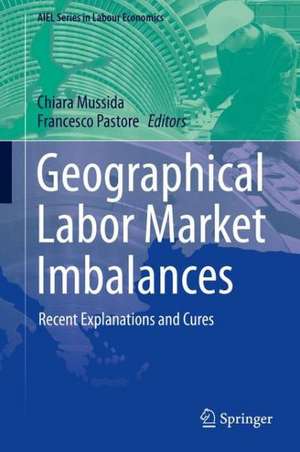Geographical Labor Market Imbalances: Recent Explanations and Cures: AIEL Series in Labour Economics
Editat de Chiara Mussida, Francesco Pastoreen Limba Engleză Hardback – 13 mai 2015
| Toate formatele și edițiile | Preț | Express |
|---|---|---|
| Paperback (1) | 644.63 lei 43-57 zile | |
| Springer Berlin, Heidelberg – 17 oct 2016 | 644.63 lei 43-57 zile | |
| Hardback (1) | 651.02 lei 43-57 zile | |
| Springer Berlin, Heidelberg – 13 mai 2015 | 651.02 lei 43-57 zile |
Preț: 651.02 lei
Preț vechi: 765.90 lei
-15% Nou
Puncte Express: 977
Preț estimativ în valută:
124.57€ • 130.41$ • 103.08£
124.57€ • 130.41$ • 103.08£
Carte tipărită la comandă
Livrare economică 07-21 aprilie
Preluare comenzi: 021 569.72.76
Specificații
ISBN-13: 9783642552021
ISBN-10: 3642552021
Pagini: 350
Ilustrații: XII, 370 p. 53 illus.
Dimensiuni: 155 x 235 x 27 mm
Greutate: 0.71 kg
Ediția:2015
Editura: Springer Berlin, Heidelberg
Colecția Springer
Seria AIEL Series in Labour Economics
Locul publicării:Berlin, Heidelberg, Germany
ISBN-10: 3642552021
Pagini: 350
Ilustrații: XII, 370 p. 53 illus.
Dimensiuni: 155 x 235 x 27 mm
Greutate: 0.71 kg
Ediția:2015
Editura: Springer Berlin, Heidelberg
Colecția Springer
Seria AIEL Series in Labour Economics
Locul publicării:Berlin, Heidelberg, Germany
Public țintă
ResearchCuprins
Introduction.- Determinants of Regional Unemployment: Worker Turnover Across Italian Regions.- Spatial Patterns of German Labor Market: Panel Data Analysis of Regional Unemployment.- Compensating Wage Differentials Across Russian Regions.- Convergence Across Regions in Kazakhstan.- Agglomeration Economies: Agglomeration Economies and Employment Growth in Italy.- Do Agglomeration Externalities Enhance Regional Performances in Production Process? A Stochastic Frontier Approach.- Employers' Agglomeration and Innovation in a Small Business Economy: The Italian Case.- Differences in Human Capital and R& D: Do FDI in Business Services Affect Firms' TFP? Evidence from Italian Provinces.- Explaining the Patenting Propensity. A Regional Analysis Using EPO-OECD Data.- Family Origin and Early School Leaving in Italy: The Long-Term Effects of Internal Migration.- The Effect of University Costs and Institutional Incentives on Enrolments: Empirical Evidence for Italian Regions.- Globalized Markets, Globalized Information and Female Employment: Accounting for Regional Differences in 30 OECD Countries.- Regional Policy: Structural Funds and Regional Convergence. Some Sectoral Estimates for Italy.- Fostering the Self-Employment in Spain: An Evaluation of the Capitalization of Unemployment Benefits Programme.- Regional Price Indices and Real Wage Equalization in Poland.
Recenzii
“The papers analyse the issue of geographical labour market imbalances from a very broad perspective … . the reader will find several empirical facts, new references, research questions, and empirical strategies that will be useful to understand and explore the origins and the consequences of labor market disparities for economies and regions. All regional economists interested in labour market issues should definitely find a place for this book on the shelves of their libraries.” (Antonio Accetturo, Papers in Regional Science, Vol. 95 (2), June, 2016)
“I studied ‘Geographical Labor Market Imbalances’ with great pleasure and great benefits for myself and would like to recommend it to wider audience, including researchers, students and professors in the areas of labor market, regional economics and comparative economics.” (Olga Demidova,Journal of Economics Bibliography, Vol. 3 (1), March, 2016)
“Geographical Labor Market Imbalances represents a collective volume of outstanding scientific papers concerning regional issues … . The chapter’s authors … succeed in clarifying relevant and actual issues of the regional labor market and present them in a clear and accessible way without charge or overwhelming the reader with specialist terms. … The spectrum of readers to whom the book is addressed is large … making it possible to realize them on a higher level in future research.” (Daniela Paşnicu, Annals of Spiru Haret University Economics Series, Vol. 16 (1), 2016)
“I studied ‘Geographical Labor Market Imbalances’ with great pleasure and great benefits for myself and would like to recommend it to wider audience, including researchers, students and professors in the areas of labor market, regional economics and comparative economics.” (Olga Demidova,Journal of Economics Bibliography, Vol. 3 (1), March, 2016)
“Geographical Labor Market Imbalances represents a collective volume of outstanding scientific papers concerning regional issues … . The chapter’s authors … succeed in clarifying relevant and actual issues of the regional labor market and present them in a clear and accessible way without charge or overwhelming the reader with specialist terms. … The spectrum of readers to whom the book is addressed is large … making it possible to realize them on a higher level in future research.” (Daniela Paşnicu, Annals of Spiru Haret University Economics Series, Vol. 16 (1), 2016)
Textul de pe ultima copertă
This book focuses on the questions of how territorial differences in productivity levels and unemployment rates arise in the first place and why territorial differences in labor market performance persist over time. Unemployment divergence and unemployment club convergence have been touched on in a large number of works and have recently also been studied using spatial econometric analysis. In this book we aim to develop the debate to include several important new topics, such as: the reasons why structural changes in some sectors cause slumps in some regions but not in others; the extent to which agglomeration factors explain regional imbalances; the degree of convergence / divergence across EU countries and regions; the role of labor mobility in reducing / increasing regional labor market imbalances; the impact of EU and country-level regional policy in stimulating convergence; and the (unsatisfactory) role of active labor market policy in stimulating labor supply in the weakest economic areas.
Caracteristici
A new theoretical approach deepens readers’ understanding of regional imbalances Special focus on new aspects and new areas of regional imbalances: agglomeration, FDI distribution and patenting intensity A wealth of tables and figures amply illustrate the discussion Includes supplementary material: sn.pub/extras




















